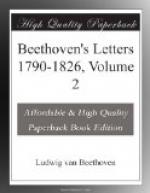Your loving
FATHER,
Who fondly embraces you.
450.
TO THE ABBE MAXIMILIAN STADLER.
February 6, 1826.
REVEREND AND HONORED SIR,—
You have really done well in rendering justice to the manes of Mozart by your inimitable pamphlet, which so searchingly enters into the matter [the Requiem], and you have earned the gratitude of the lay and the profane, as well as of all who are musical, or have any pretensions to be so. To bring a thing of this kind forward as H.W.[1] has done, a man must either be a great personage, or a nonentity. Be it remembered also that it is said this same person has written a book on composition, and yet has ascribed to Mozart such passages as the following:—
[Music: Bass clef]
and has added such things as,—
[Music: Treble clef, B-flat major. A-gnus de-i pec-ca-ta mun-di.]
[Music: Treble clef, B-flat major. Qui tol-lis pec-ca-ta, qui tol-lis pec-ca-ta,]
as samples of his own composition! H.W.’s astonishing knowledge of harmony and melody recall the old composers of the Empire,—Sterkel, [illegible,] Kalkbrenner (the father), Andre, &c.
Requiescant in pace! I especially thank you, my dear friend, for the pleasure you have conferred on me by your pamphlet. I have always accounted myself one of Mozart’s greatest admirers, and shall continue to be so to my last breath. I beg, venerable sir, for your blessing, and I am, with sincere esteem and veneration, yours,
BEETHOVEN.
[Footnote 1: Gottfried Weber, the well-known theorist, who was one of those engaged in the dispute as to the genuineness of Mozart’s Requiem.]
451.
TO GOTTFRIED WEBER.
April 3, 1826.
Holz tells me that it is your intention to publish a larger size of the engraving representing Handel’s monument, in St. Peter’s Church in London. This affords me extreme pleasure, independent of the fact that I was the person who suggested this. Accept my thanks beforehand.
I am your obedient
BEETHOVEN.
452.
TO HERR PROBST, MUSIC PUBLISHER,—LEIPZIG.
Vienna, June 3, 1826.
SIR,—
I always consider myself in some degree bound to make you the offer of my compositions when it is possible to do so. I am at this moment more at liberty than usual. I was obliged to give my minor works to those who took the greater ones also, as without the former they refused to accept the latter. So far as I remember, however, you wished to have nothing to do with the greater works. In this view, I offer you an entirely new Quartet for two violins, viola and violoncello; you must not, however, be surprised at my demanding the sum of 80 gold ducats for it. I assure you, upon my honor, that the same sum has been remitted to me for several quartets. I must request you, in any event, to write to me on this point




